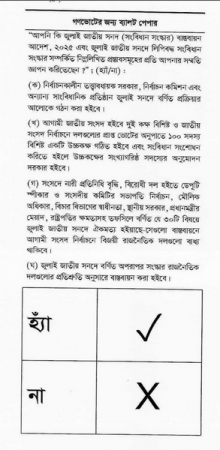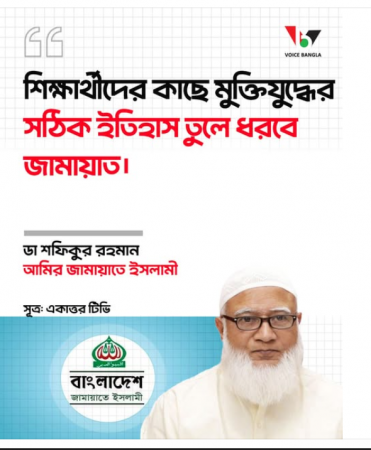Many people, who are not acquainted with the history and sociopolitical aspects of Bangladesh, are becoming bewildered by hearing the news of the protesters of the Shahbag rally, who are demanding capital punishment for people convicted of war crimes, crimes against humanity and genocide committed during the 1971 war of independence from Pakistan.
They are asking,
1. Why are protesters asking to hang a convict when he already has got life imprisonment as punishment?
2. Why are protesters demanding for death sentence for other accused when their cases sub judice?
Life imprisonment is the most stringent sentence for any types of crime in some countries. To their perspective, demands of the protesters are too harsh and somewhat detrimental to the judicial system.
Background
The crimes committed by the accused were indubitably one of the most heinous act of the last century vie with the genocides of Germany, Cambodia or Rwanda. It was on simple sense a crime against humanity. Pakistani authorities were so insolent that they didn’t even bother to keep their real intentions in camera. West Pakistanis, especially Punjabis had racial aversions towards the Bangalis. Bangalis were being deprived of every aspects of life. In the war of 1971 a senior leader of Pakistani government bragged that, they need only land but not necessary its people.
Liberation of the Bangladesh was not merely instigated by a group of separatist but the aspiration of its mass. Very few people were disinclined to support the causes of the liberation of this land. Pakistani military government picked some of them. This group called themselves Rajakar. Razakars were in effect the auxiliary of the Pakistani forces created by the gubernatorial ordinance and later became a part of the Pakistan Army. Along with Razakar Forces, there were other two unofficial but much more malevolently efficient paramilitary forces called Al Badr and Al Shams. Technically, they were not part of the government forces but worked closely with them. Their reputations were much more iniquitous than larger Razakar Forces. Apart from these three parties, there were two other groups called “Peace Committee” consisted of influential senior citizen and intellectuals, sympathetic to Pakistani junta and “Al Mujahid” consisted of non-Bengali Biharis. Most of the members of the “Peace Committee” and Razakar and nearly all of the members of Al Badr and Al Shams worked under the umbrella of Jamaat-e-Islami or simply Jamaat, who itself was the member of the provincial government of East Pakistan then a part opposing forces of the Bangladesh. Some of Jammat’s leaders hold several posts of the East Pakistan’s provincial cabinet. However, anyone collaborated with the Pakistani authority or opposed the causes of war of the independence are now popularly known as simply “Razakar”, irrespective of their affiliation.
They had planned systematically with the Pakistani military forces for ethnic cleansing of Bangali, ransacked all over the country, murdered and raped innocent people including minors and supplied women to the Pakistani forces for pleasure during the war. During the twilight of the demise of Pakistani authorities in Bangladesh, members of the Jammat had killed thousands of civilian intellectuals with the help of Pakistani forces.
Bangladesh had achieved victory in December 16, 1971 after nine month of the declaration of independence. After the war, most of the common sympathizer or supporters among the Razakars (excluding the war criminals) of Pakistan had been granted a general amnesty in an effort of reconciliation. Jamaat-e-Islami as a party, had been banned by the government of the newly independent country due to their institutionalize genocide during the war and conspiracy against the nation and country by collaborating with the enemy forces. Some of its top brasses who were also war criminals had been disenfranchised and brought to the justice. Some of them simply fled the country right after or before the war, apprehending the imminent defeat. Somehow, most of the convict had succeeded to elude the justice during the unprecedented political turmoil after the fall of BAL.
Jammat began to enter in the political arena slowly but steadfastly in the middle of the 1970s. Some of its leaders who had fled the country returned within this time. They had taken every opportunity to manipulate the political vendetta among the national parties like BAL (Bangladesh Awami League), BNP (Bangladesh Nationalist Party) or JP (Jatiya Party) and other lesser leftist and religious parties. By the end of the political turmoil, during the dawn of the democracy in the country for the first time in 1991 since February 24, 1975, Jammat had succeeded to establish themselves as the fourth largest party in the nation. Never in the history of modern nation-state has a party who opposes its very birth managed to function freely even without changing its original motto, let alone taking part in the national election.
They had planned meticulously to breed new generation of supporters by sponsoring and coach young students to enroll on the
colleges or graduate school in the home and abroad. Jammat does not have large scale general or floating supportive base but a group of hardcore followers and their family members. Indeed, it’s a grim reality that the Jammat is relatively much more democratic within itself than the major parties like BAL, BNP or JP. As in these days, it seems they have managed to manipulate the small religious based parties on the ground of religious derogatory remark said to be (by the Jammat supporter) commented by some protesters from the Shahbag. Ironically, these religious parties are among the staunch opponent of Jammat on the issues of religious school and function.
Jammat also had patronized business enterprises, which are among the most richest and efficient in the Bangladesh. It would not be an overestimation that there would be some sorts of pecuniary influence to create new supporter.
TIME LINE - MATTER of WAR CRIME
(1971-1975)
In 1973 Bangladesh government took an initial step for the first time to try the .............................................
click here for remnant


 অনুগ্রহ করে অপেক্ষা করুন। ছবি আটো ইন্সার্ট হবে।
অনুগ্রহ করে অপেক্ষা করুন। ছবি আটো ইন্সার্ট হবে।






